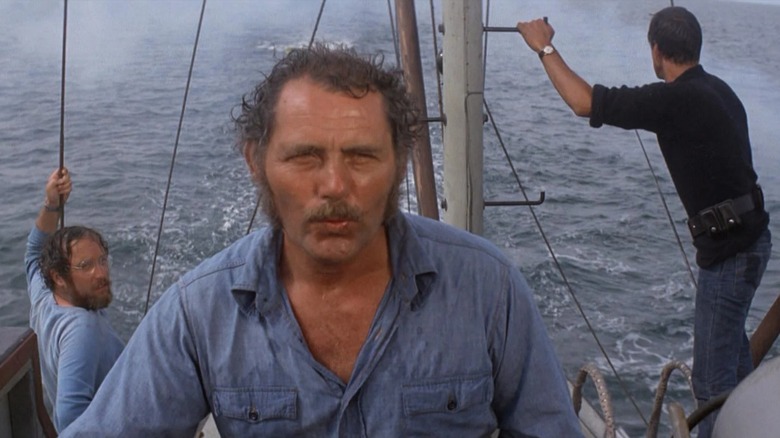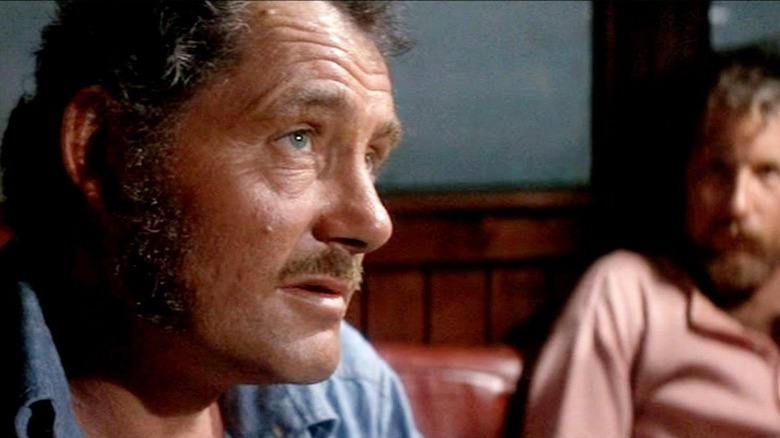Steven Spielberg Wanted These Two Actors To Play Quint In Jaws Before Robert Shaw
You can't have "Jaws" without Quint, a modern Captain Ahab if he'd been hunting a great white shark rather than a white whale. It's difficult to picture anyone but Robert Shaw (in one of his last roles before his premature death in 1978) in the part, but the actor actually wasn't who director Steven Spielberg first had in mind.
In "Spielberg: The First Ten Years" by Laurent Bouzereau, Spielberg claimed his first choice for Quint was Lee Marvin. He wanted a big star and Marvin was famous for playing sinister tough guys. See: "The Big Heat," "Point Blank," "The Dirty Dozen," and "The Man Who Shot Liberty Valance" (directed by the man who taught Spielberg how to frame a horizon.) Marvin, though, said no. Spielberg recounted: "What I heard was that [Marvin] wanted to go fishing for real! He took his fishing very seriously and didn't want to do it from a 'movie' boat."
Spielberg's next choice was Sterling Hayden, an Old Hollywood star who was back in the public eye after his part as Captain McCluskey in "The Godfather." Spielberg was a fan of Hayden's work with Stanley Kubrick; nowadays, Hayden is most remembered for playing General Jack D. Ripper in "Doctor Strangelove." Ripper is an insane man, but one with strong convictions (much like Quint). Hayden had also previously played an Ahab-esque harpooner in 1958 Western "Terror in a Texas Town." For a reason Spielberg couldn't recall, though, Hayden was also unavailable.
That's when producers Richard Zanuck and David Brown suggested Shaw, with whom they'd previously worked on "The Sting." Shaw played the gangster Doyle Lonnegan, opposite Robert Redford and Paul Newman as a pair of plucky card sharks.
Spielberg, impressed by Shaw's performances in "A Man For All Seasons" (as King Henry VIII) and James Bond film "From Russia With Love" (as the movie's heavy), was convinced. "I wish I had thought of him!"
Jaws without Robert Shaw wouldn't have Quint's Indianapolis monologue
It's hard to pick just one "greatest moment" in "Jaws," but we all know what Quint's best-remembered scene is. After Brody (Roy Scheider) and Hooper (Richard Dreyfuss) notice a removed tattoo on Quint's arm, he tells about his service on the U.S.S. Indianapolis in World War 2. As in real life, the ship wound up sunk, leaving the crew stranded in the ocean without rescue for five days. "Eleven hundred men went into the water. 316 men come out, the sharks took the rest, June the 29th, 1945."
Here's the thing though: that monologue, and the backstory for Quint detailed within it, only exists as it does because of Shaw. The scene is nowhere in the original "Jaws" novel by Peter Benchley. According to Spielberg, screenwriter Howard Sackler (who did uncredited rewrites on "Jaws") felt that Quint needed more motivation to be so dead set on killing the shark. So, he dug up the real story of the U.S.S. Indianapolis. Shaw, a writer as well as an actor, wrote Quint's Indianapolis monologue himself. There's been some debate over who wrote the filmed speech, with some giving credit to filmmaker John Milius, but "Jaws" screenwriter Carl Gottlieb maintains it was Shaw.
Since the monologue reportedly began with Sackler, some version of it could've still been delivered by Marvin or Hayden as Quint. But Shaw's particular prose, such as when Quint observes sharks have, "lifeless eyes. Black eyes, like a doll's eyes"? Those exact words would've never been written, and "Jaws" would be poorer for it.
This shows the ripple effects of casting; actors can bring much more to their characters than just what's obvious onscreen. It's not just how they say a particular line, it's how they inhabit their character and understand why that person would say those words in that moment. Robert Shaw, as the kids say, understood the assignment (and did extra credit along the way).

